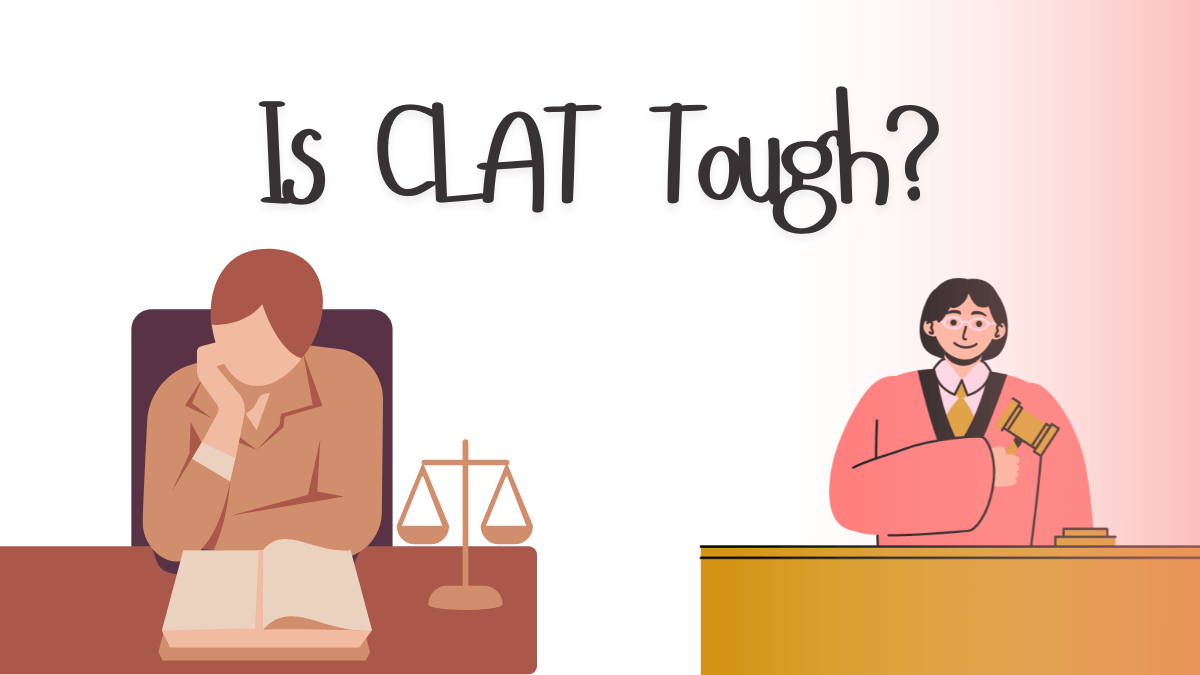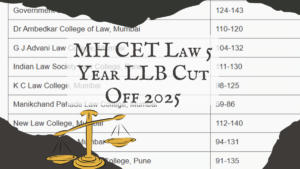Table of Contents
Is CLAT Tough? – this question comes into the mind of every law aspirant before starting the CLAT Preparation. But it depends on aspirant to aspirant as each student has different weaknesses and strengths. In this article, we will decode whether the CLAT exam is tough or not for you and how can you make this preparation easy. The CLAT 2026 exam is scheduled for December 07, 2025 (expected).
Is CLAT Tough?
The CLAT Entrance Exam, like any other examination, can be rated as simple or tough depending on an individual’s skill, earlier education, and perspective. The Consortium of NLUs in India administers the CLAT, a national-level entrance examination every year.
Every year, more than a lakh aspiring law students sit the exam, which is regarded as one of the most competitive and hardest in the country. This exam serves as the starting point for both undergraduate and graduate legal programs. Certain students may regard the test as very simple and under their control, whilst others may feel CLAT as demanding and difficult.
CLAT Exam Overview
Before knowing about the CLAT exam difficulty level, take a look at the highlights of the latest CLAT Exam here.
| CLAT Exam | |
| Particulars | Details |
| Exam Mode | Offline (Pen & Paper based) |
| Medium of Language | English |
| Type of questions |
Multiple choice with comprehension passages
|
| Total Number of Questions | 120 |
| Total CLAT Marks | 120 |
| Duration | 2 Hours |
| Skills tested | Reading ability, critical thinking, and analytical skills |
| Correct Marks | 1 Mark |
| Negative Marking | Yes (0.25 Marks) |
| Prior knowledge of the law | Not require any law knowledge |
Is CLAT Syllabus Lengthy?
The CLAT exam is said difficult because of its fierce competition. Almost one lakh people competing for a limited number of seats in the (NLUs). The exam is designed to assess a wide range of skills and information, including general knowledge, current events, legal thinking, logical reasoning, and competency in the English language. To excel in the CLAT entrance exam, candidates must prepare thoroughly the CLAT Syllabus and have a good foundation in these subjects.
How is the Paper Pattern of CLAT?
Understanding the CLAT Exam Pattern 2025 for UG & PG is critical to pass the CLAT on their first attempt. The CLAT LLB exam will have 120 questions, each worth one mark. The UG exam will include tests in English, General Knowledge, Logical Reasoning, Legal Aptitude/Reasoning, and Quantitative Techniques.
| CLAT UG Paper section wise weightage | ||
| Subject | Percentage weightage |
Number of questions
|
| English Language | 20% |
22-26 questions
|
| Current Affairs, including General Knowledge | 25% |
28-32 questions
|
| Legal Reasoning | 25% |
28-32 questions
|
| Logical Reasoning | 20% |
22-26 questions
|
| Quantitative Techniques | 10% |
10-14 questions
|
CLAT Difficulty Level Latest Analysis
Check the latest difficulty level of the CLAT exam by going through the sectoion-wise cut off marks below.
| CLAT Section Wise Cutoff (Last Year) | |
| Sections | Cutoff Marks |
| English Language | 28+ |
| Current Affairs including General Knowledge | 22+ |
| Logical Reasoning | 21+ |
| Legal Reasoning | 35+ |
| Quantitative Techniques | 15+ |
What is the Difficulty Level of CLAT Paper?
Here we are discussing the CLAT Paper level of last year for undergraduate courses.
- According to aspirants, the CLAT 2024 exam was simpler than last year, with some hard questions in the Quantitative Techniques for UG section.
- CLAT paper analysis for the exam was regarded as simple, with only a few tough questions in Logical Reasoning, Legal Aptitude, and General Knowledge (unexpected by some).
- However, students reported that the CLAT question paper was quite lengthy, and two hours was insufficient for them.
Is CLAT Tougher than JEE
CLAT and JEE serve different fields of study – law and engineering, respectively. The difficulty of each exam is subjective and differs from individual to individual. Some might consider CLAT more difficult because of its focus on legal reasoning and understanding abilities. Meanwhile, some individuals might find it challenging to tackle the intricate problem-solving needed for JEE.
Is CLAT Exam Tougher than NEET
Although both CLAT and NEET are competitive entrance tests, they evaluate different abilities. CLAT emphasizes proficiency in law subjects, whereas NEET evaluates understanding in medical fields. The difficulty of each exam can differ based on personal strengths and how well one prepares.
How to Crack CLAT 2025 Exam?
Here are some crucial tips that you can remember to make your CLAT preparation very smooth.
- 360 Approach
A well-rounded preparation method can handle all parts of the exam, which includes general knowledge, legal acumen, logical reasoning, and English competence. - Structured Study Plan.
Creating a systematic study plan. Breaking down concepts, setting reasonable goals, having a note-making strategy, and following a study routine can all help you learn more effectively. - Coaching and counselling
Students can benefit from expert coaching when navigating problems. Seeking advice from experienced CLAT exam mentors or enrolling in coaching sessions can provide significant tips, study resources, and techniques for tackling the CLAT. - Practice more to manage time in exams
To succeed in entrance exams, students need to practice effective time management skills. Practicing with mock tests and topic tests can improve speed and accuracy. - CLAT Previous Year’s Papers
CLAT PYQ might provide information about the exam pattern, sorts of questions, and areas that need greater attention. This can help you comprehend the exam’s complexities and prepare appropriately. - Positive Mindset
It is critical to maintain an optimistic outlook and overall preparation. Recognizing the issue and approaching it with confidence, self-belief, and a growth attitude will help you overcome obstacles.



 MH CET Law 5 Year LLB Cut Off 2025, Chec...
MH CET Law 5 Year LLB Cut Off 2025, Chec...
 Top Law Colleges in India 2025- Rank, Fe...
Top Law Colleges in India 2025- Rank, Fe...
 CUET PG Law Syllabus 2025 PDF Download, ...
CUET PG Law Syllabus 2025 PDF Download, ...








